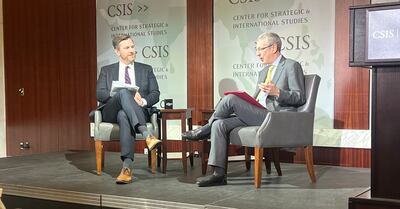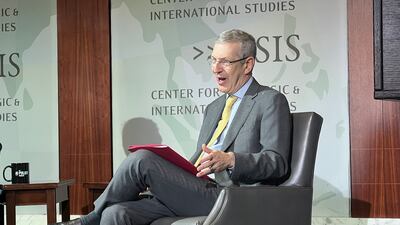Amid criticism from Nvidia and various technology advocacy groups, a US official has defended President Joe Biden’s recently announced artificial intelligence diffusion rules, which are aimed at stopping American-made technology from falling into the hands of enemies.
“The controls we put on semiconductors and semiconductor equipment have all been about impeding the PRC’s [People's Republic of China] ability to build the large language models that can threaten the US and its allies from a national security perspective,” said Alan Estevez, undersecretary of commerce for industry and security, during an event at the Centre for Strategic and International Studies on Tuesday.

“AI can enhance military operations, command and control, targeting, logistics, autonomous warfare, all those things are very worrisome,” he said, referring to continuing efforts by the Department of Commerce to prevent AI technology and semiconductor production in the US from being used against the country.
On Monday, the Biden administration bolstered those efforts by announcing an “interim final rule on artificial intelligence diffusion” that it said will help thwart smuggling, close loopholes and raise AI security standards. The rules revolve around six mechanisms that the White House said would “catalyse the responsible diffusion of US technology” to the rest of the world.
One rule states that there will be no restrictions for US allies and partners, including Australia, Belgium, Canada, Denmark, Finland, France, Germany, Ireland, Italy, Japan, the Netherlands, New Zealand, Norway, South Korea, Spain, Sweden, Taiwan and the UK. Other countries, meanwhile, fall into second and third-tier categories that can make acquiring US technology more difficult.
Another rule states that “chip orders with collective computation power up to roughly 1,700 advanced graphics processing units (GPUs) do not require a licence and do not count against national chip caps”.
“Even as it encourages the diffusion of US technology, the rule takes significant steps against countries of concern, constraining them from accessing advanced AI systems and the computing power used to train them,” read a White House fact sheet.
At the CSIS event, Mr Estevez was asked to address fears that the US's efforts to increase import and export controls, along with the recently announced AI diffusion policy, will annoy Chinese officials and potentially accelerate the country's efforts to de-Americanise its own technology.
“They're doing what they want to do,” he said. “I'd rather have them spend the money on building a semiconductor sector than building a seeker missile but they're pressing forward to do what they want to do, and they were doing that before the export controls. Their drive to technology indigenisation has nothing to do with export controls … there's nothing we're doing that's expediting that path, but it is making that path more difficult.”
Nvidia and others criticise AI diffusion rules
In a rare move, Nvidia, the California-based chip designer and maker of GPUs that has been at the centre of the recent AI economic boom, quickly came out against the rules, going so far as to mention Mr Biden's soon-to-be successor, president-elect Donald Trump.
“In its last days in office, the Biden administration seeks to undermine America’s leadership with a 200-plus-page regulatory morass, drafted in secret and without proper legislative review,” read a statement from Ned Finkle, vice president of government affairs at Nvidia.

“The first Trump administration laid the foundation for America’s current strength and success in AI, fostering an environment where US industry could compete and win on merit without compromising national security. That global progress is now in jeopardy. The Biden administration now seeks to restrict access to mainstream computing applications with its unprecedented and misguided 'AI Diffusion' rule, which threatens to derail innovation and economic growth worldwide.”
A source at Nvidia later told The National that the new rules will make it harder for other countries, such as the UAE, a US ally, to build capacity for “non-frontier AI use cases”. Frontier AI is a term used to describe highly capable AI models and technologies that could pose severe risks to public safety. “This would capture a lot of GPUs that are included in gaming and other applications like health care and scientific research that don't have anything to do with frontier AI,” the source said.
The Information Technology and Innovation Foundation, a technology trade group based in Washington, said that the new rules will unfairly pressure nations to choose between the US and China, which could potentially backfire on the US and technology companies based there. “The administration risks alienating key partners and inadvertently strengthening China’s position in the global AI ecosystem,” wrote the foundation's vice president Daniel Castro.
“The solution is not to further restrict access to AI chips or models but to reassess the current strategy. Future policies should prioritise enhancing US competitiveness in AI by expanding market access for US chips and AI technologies to secure a dominant global market share for American firms, and countering geostrategic competitors like China and Russia, which are actively forming alliances such as the Brics AI Alliance to provide their partners with access to critical AI resources.”


